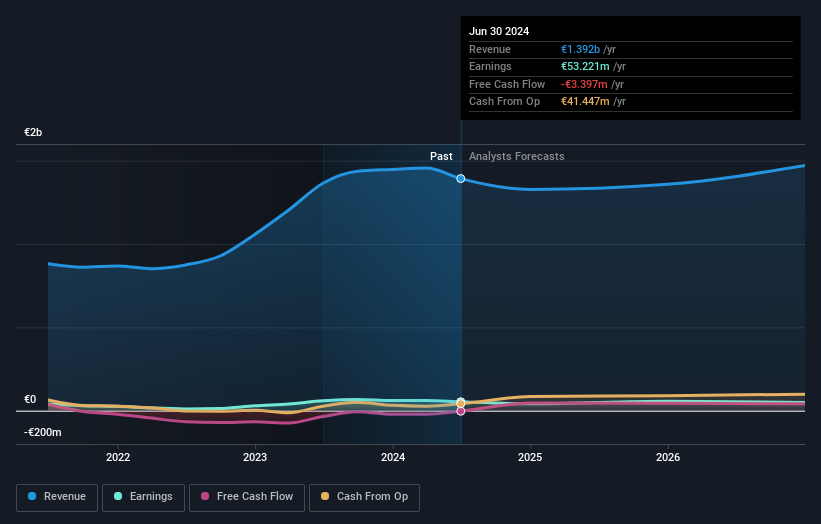Private equity firms among Knaus Tabbert AG's (ETR:KTA) largest stockholders and were hit after last week's 14% price drop

Key Insights
- The considerable ownership by private equity firms in Knaus Tabbert indicates that they collectively have a greater say in management and business strategy
- A total of 2 investors have a majority stake in the company with 66% ownership
- Institutional ownership in Knaus Tabbert is 11%
If you want to know who really controls Knaus Tabbert AG (ETR:KTA), then you'll have to look at the makeup of its share registry. The group holding the most number of shares in the company, around 41% to be precise, is private equity firms. In other words, the group stands to gain the most (or lose the most) from their investment into the company.
And following last week's 14% decline in share price, private equity firms suffered the most losses.
Let's delve deeper into each type of owner of Knaus Tabbert, beginning with the chart below.
View our latest analysis for Knaus Tabbert

What Does The Institutional Ownership Tell Us About Knaus Tabbert?
Institutions typically measure themselves against a benchmark when reporting to their own investors, so they often become more enthusiastic about a stock once it's included in a major index. We would expect most companies to have some institutions on the register, especially if they are growing.
Knaus Tabbert already has institutions on the share registry. Indeed, they own a respectable stake in the company. This implies the analysts working for those institutions have looked at the stock and they like it. But just like anyone else, they could be wrong. If multiple institutions change their view on a stock at the same time, you could see the share price drop fast. It's therefore worth looking at Knaus Tabbert's earnings history below. Of course, the future is what really matters.

Knaus Tabbert is not owned by hedge funds. Looking at our data, we can see that the largest shareholder is HTP Investments B.V. with 41% of shares outstanding. With 25% and 3.1% of the shares outstanding respectively, Catalina Capital Partners B.V. and T. Rowe Price Group, Inc. are the second and third largest shareholders.
A more detailed study of the shareholder registry showed us that 2 of the top shareholders have a considerable amount of ownership in the company, via their 66% stake.
Researching institutional ownership is a good way to gauge and filter a stock's expected performance. The same can be achieved by studying analyst sentiments. Quite a few analysts cover the stock, so you could look into forecast growth quite easily.
Insider Ownership Of Knaus Tabbert
While the precise definition of an insider can be subjective, almost everyone considers board members to be insiders. The company management answer to the board and the latter should represent the interests of shareholders. Notably, sometimes top-level managers are on the board themselves.
Most consider insider ownership a positive because it can indicate the board is well aligned with other shareholders. However, on some occasions too much power is concentrated within this group.
Our data cannot confirm that board members are holding shares personally. Not all jurisdictions have the same rules around disclosing insider ownership, and it is possible we have missed something, here. So you can click here learn more about the CEO.
General Public Ownership
The general public, who are usually individual investors, hold a 23% stake in Knaus Tabbert. While this group can't necessarily call the shots, it can certainly have a real influence on how the company is run.
Private Equity Ownership
Private equity firms hold a 41% stake in Knaus Tabbert. This suggests they can be influential in key policy decisions. Some investors might be encouraged by this, since private equity are sometimes able to encourage strategies that help the market see the value in the company. Alternatively, those holders might be exiting the investment after taking it public.
Private Company Ownership
Our data indicates that Private Companies hold 25%, of the company's shares. It's hard to draw any conclusions from this fact alone, so its worth looking into who owns those private companies. Sometimes insiders or other related parties have an interest in shares in a public company through a separate private company.
Next Steps:
It's always worth thinking about the different groups who own shares in a company. But to understand Knaus Tabbert better, we need to consider many other factors. For example, we've discovered 2 warning signs for Knaus Tabbert (1 makes us a bit uncomfortable!) that you should be aware of before investing here.
If you would prefer discover what analysts are predicting in terms of future growth, do not miss this free report on analyst forecasts.
NB: Figures in this article are calculated using data from the last twelve months, which refer to the 12-month period ending on the last date of the month the financial statement is dated. This may not be consistent with full year annual report figures.
Valuation is complex, but we're here to simplify it.
Discover if Knaus Tabbert might be undervalued or overvalued with our detailed analysis, featuring fair value estimates, potential risks, dividends, insider trades, and its financial condition.
Access Free AnalysisHave feedback on this article? Concerned about the content? Get in touch with us directly. Alternatively, email editorial-team (at) simplywallst.com.
This article by Simply Wall St is general in nature. We provide commentary based on historical data and analyst forecasts only using an unbiased methodology and our articles are not intended to be financial advice. It does not constitute a recommendation to buy or sell any stock, and does not take account of your objectives, or your financial situation. We aim to bring you long-term focused analysis driven by fundamental data. Note that our analysis may not factor in the latest price-sensitive company announcements or qualitative material. Simply Wall St has no position in any stocks mentioned.
About XTRA:KTA
Good value slight.
Similar Companies
Market Insights
Community Narratives



